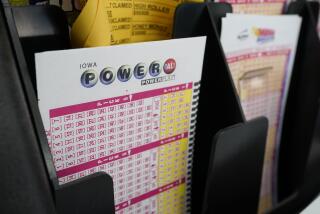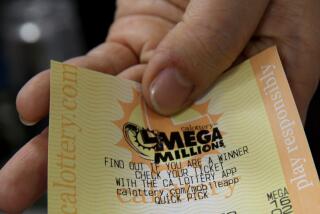Gamble Pays Off for Some Residents in Shrinking Texas Town
- Share via
ROBY, Texas — The 616 residents of this desolate West Texas farm town long have gambled on forces beyond their control.
Year after year, they put their money on a high-stakes crapshoot with the heavens, praying for enough rain and sun to coax white puffs of cotton from the rusty red earth. Year after year, Mother Nature deals them floods, drought, pestilence and freezes--a reign of calamity that has threatened to add Roby’s name to the graveyard of rural America.
But on the night before Thanksgiving, good luck embraced this corner of the prairie as capriciously as misfortune had taunted it.
Thurman Terry, the 82-year-old patriarch of a pioneer cotton-farming clan, won the lottery. So did his children. And his grandchildren. And his nieces and nephews. And their cousins and in-laws and employees and friends. In all, 43 people--almost all of them affiliated with the struggling Terry Cotton Gin--hit the Texas Lotto’s $46.6-million jackpot.
Overnight, one out of every 15 Roby citizens became a millionaire.
“It couldn’t happen to a better bunch of people--including me,” said Vernon “Bunny” Terry, 59, sipping coffee under a straw cowboy hat. “We’re on our last leg out here.”
To the good folk of Roby--many of whom have spent a lifetime fretting together over the fickle weather, extending each other credit and wondering whether their community will even survive another generation--the bonanza was nothing short of manna.
The town’s main drag is home to boarded-up gas stations and vacant banks, a gutted motel and a weed-choked seed store, a forgotten movie theater and a hastily abandoned flower shop with dying plants still in the front window. The population shrinks every year, now less than half of what it was in the 1950s. The pocket-sized phone book has only six pages. Churches outnumber stoplights 3 to 1.
“My opinion? I really believe God knew that a lot of people here needed help,” said Peggy Dickson, the cotton gin’s 48-year-old bookkeeper who on a whim collected the $10 contributions that financed a pool of 430 Quick Pick tickets. “Now, that’s just my opinion. It may offend some people. But it’s the way I really feel.”
Yet for all the euphoria--heightened by a phalanx of TV crews and congratulatory headlines about “Roby’s Millionaire Gang”--the disheartening facts of life here won’t change soon.
Like most state lotteries, the money will be parceled out over 20 years, giving each winner an annual check that probably won’t exceed $40,000, after taxes. That’s nothing to sneeze at, especially in a town where the average income is half as much. Still, most farmers borrow at least three times that sum to plant their cotton crop every year--”a bigger gamble than the lottery,” as Mayor Cecil King put it.
“This money will permit a few people to farm another year when otherwise they might not have been able to,” said King, 63, whose daughter, Kathy, was among the lucky ticket-holders. “It stops the bleeding, but that’s about all.”
Even if the winners wanted to go on a shopping spree, Roby has few places to accommodate the nouveau riche.
The nearest mall is in Abilene, 60 miles southeast of here. New cars, big-screen TVs, upholstered living room sets--almost any big-ticket item would have to be purchased outside this rock-ribbed Bible Belt town. The same holds true for most medical procedures and college educations. You’d have to drive 20 miles just to buy a celebratory bottle of champagne, seeing as how Roby sells nothing stronger than Dr. Pepper.
“This money will help, but it’s not going to bring us a Super Wal-Mart,” said Jeremy Terry, 23, a loan officer at Roby’s First National Bank and a lottery winner himself. “We’ve got to make a crop for things to change. We’re in God’s hands, not the Texas Lottery Commission’s.”
Nobody knows that better than the men and women at the Terry Cotton Gin, a cavernous, corrugated barn full of chutes and ducts and rollers and brushes that separate seed from fiber, spitting out clean bundles of soft white lint. Some of the workers, in fact, may not be able to go to Austin for the official presentation of their first checks later this month.
It’s cotton season right now. Even millionaire harvesters don’t dare miss a single day.
“This is what puts food on our table; the lottery’s just the dessert,” said Lance Green, 30, the Terrys’ head ginner. Although his winnings are more than double his annual salary, Green has no plans to quit. “This ugly metal building is where everybody’s lives come together,” he said.
Every morning, a parade of farmers and hunters and civic leaders drop by the Terry gin to sip coffee and share a chaw--hence the signs that say, “No spitting in sink,” and, “No spitting in fountain.” It was during these klatches that Dickson began floating the idea of a lottery pool. She jotted down names on a pad.
“I wish everybody had gotten in on it,” Dickson said, acknowledging that a few Robyites are now grumbling about being left out. She hadn’t wanted to push for contributions, however, lest her neighbors lack the $10 minimum or view the lottery as Satan’s lure.
All three of the gin’s salaried employees, guys who make $6 or $7 an hour, anted up. So did Richard Spencer, who retired in September after 32 years as the county’s chief agricultural officer. So did Rex Beauchamp, who recently bought the Circle D convenience mart after working 18 years in the Texas oil fields. And so did Manuel Valdez, who had been the Terrys’ head ginner for 15 years, until he left in July to open a restaurant with his wife, Susie.
He was one of the last to chip in, having come over on Thanksgiving eve to help his former employers fix a piece of ginning equipment. He didn’t have the $10 on him, but Dickson later stopped by his fledgling diner, Susie’s Fish & Grill, on her way to buy the tickets.
“These are my friends,” said Valdez, who had only $136 in the bank last summer.
It is symbolic of Roby’s bind that Dickson didn’t even purchase the Quick Picks in town, although one mini-mart does sells them. “I didn’t feel I’d be lucky here,” she admitted.
So she went to Sweetwater, in the next county over, where she had a dental appointment that day. Afterward, Dickson strode into Longhorn Liquors, turning a blind eye to the firewater on its shelves. When she plopped down her $420, the Longhorn’s owner, Jim Carson, asked if he could get in on the action. That not only bought him a share of the jackpot, but entitled him to another $466,619 for selling the winning ticket.
“I had to take four blood pressure pills just to get to bed,” said Carson, 52.
Dickson was baking a caramel pie for Thanksgiving dinner when she got the news. The pie burned.
As welcome as the windfall will be for Roby, the winners are learning that sudden wealth sometimes creates problems of its own. Already, ex-spouses have demanded shares. Out-of-town financial consultants have called, brimming with unsolicited advice. A few non-winners have insinuated that the Terry family, descendants of Roby’s founding settlers a century ago, were never among the neediest townsfolk.
But even some Terrys missed the boat.
“I didn’t win, so what?” Bob Terry, a 60-year-old former crop-dusting pilot, said over coffee at the gin. “I’m not crying.”
“Well, I would be,” said Bunny, his younger and, now, richer brother.
Over at the Country Peddler, an antique shop on the main square, an enterprising craftsman is trying to capitalize on Roby’s newfound fame. Propped outside the display window are a dozen hand-painted wooden planks, each priced at $4.50.
“Roby, Tex: 576 Po-Folk, 42 Rich!” one says.
“Cotton Or Lotto?” asks another.
“50,000,000 Reasons To Move To Roby,” a third proclaims.
As of last week, not one had been sold.
More to Read
Sign up for Essential California
The most important California stories and recommendations in your inbox every morning.
You may occasionally receive promotional content from the Los Angeles Times.










